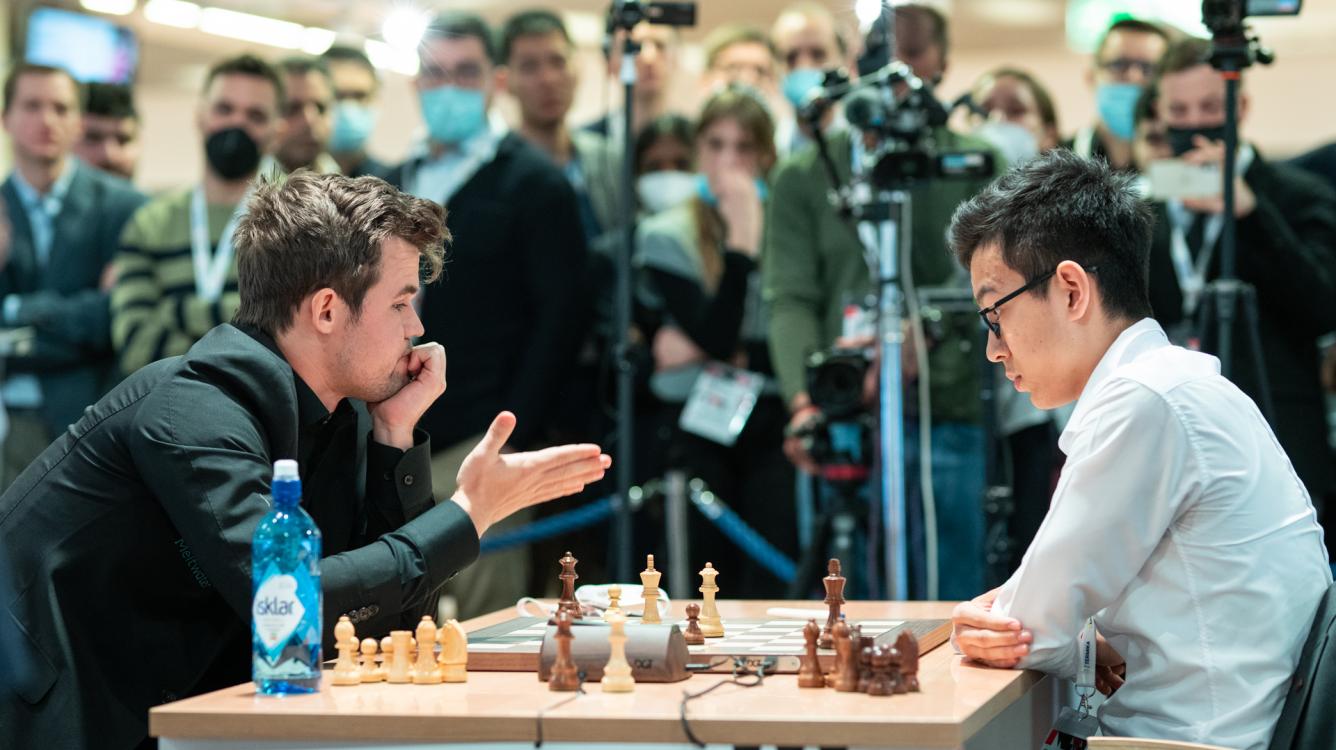
World Rapid Chess Championship Day 3: Abdusattorov and Kosteniuk Crowned World Rapid Champions
After many twists and turns on day three of the World Rapid Chess Championship, 17-year-old Uzbek GM Nodirbek Abdusattorov won the event with 9.5/13 in the Swiss tournament, after winning the second tiebreak blitz game against GM Ian Nepomniachtchi. Notably defeating GM Magnus Carlsen in the first round of the day, Abdusattorov is the youngest world rapid champion to date.
Carlsen finished in third place and GM Fabiano Caruana came fourth although both had scored 9.5/13 as well. The two did not qualify for the playoff due to a controversial tiebreak system in this event.
GM Alexandra Kosteniuk won the women's world rapid title convincingly with 9/11, making most of her gains on day two, where she took a 1.5-point lead ahead of the rest of the field. IM Bibisara Assaubayeva, who is also 17 years old, finished in second place and GM Valentina Gunina came third.
The World Blitz Chess Championship will begin on Wednesday, December 29, at 6 a.m. Pacific/15:00 Central Europe.
Going into the first round of the day, round 10, Carlsen was only a half-point above his competition, allowing plenty of room for others to catch up if he so much as drew his game. Unlike his counterpart in the women's section, Kosteniuk, the world champion had not broken away from the rest—and as we now know, at the end of the day, he never would.
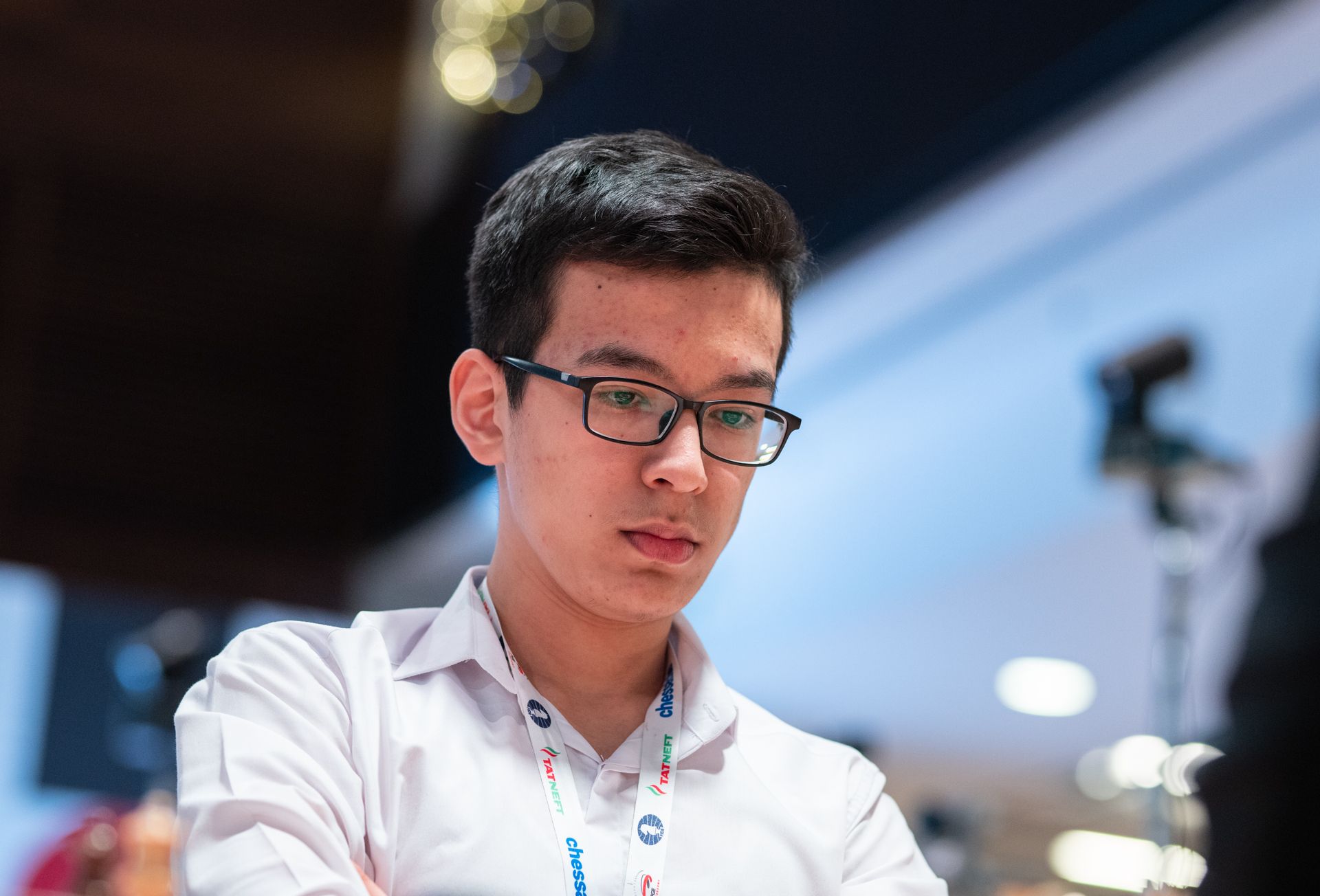
The top boards at the start of the day featured Carlsen vs. Abdusattorov, GM Alexander Grischuk vs. Nepomniachtchi, and GM Hikaru Nakamura vs. GM Alireza Firouzja. Commentator GM Irina Krush had high expectations for the board-one matchup, listing Abdusattorov's upset his wins against elite players by this point: GMs Caruana, Levon Aronian, Radoslaw Wojtaszek, and Boris Gelfand before this game.
The tense game ended with the young Uzbek prodigy applying pressure until the very end. Just when Carlsen seemed to achieve an equal queen-endgame, and was defending with remarkable technique, he chose the wrong plan on move 81 when he instead had a perpetual check in hand.
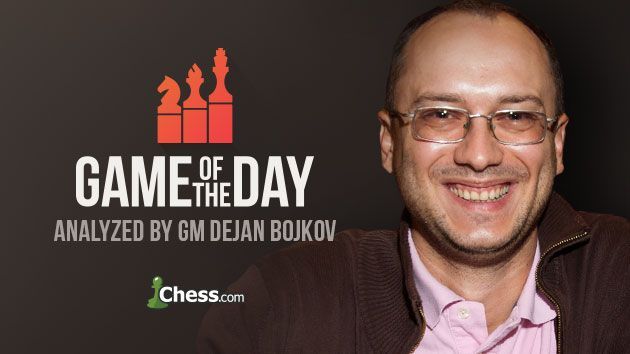
17-year old Uzbek Abdusattorov has just beaten the world champion, is completely relaxed about it and just focused on the rest of the event. "It's a huge victory, but I am expecting to play better in the next rounds." he tells NRK. #RapidBlitz pic.twitter.com/d5Fmt1Xlob
— Tarjei J. Svensen (@TarjeiJS) December 28, 2021
Nepomniachtchi won a technical queen and rook endgame against Grischuk, a big win against one of the three players a half-point behind Carlsen before the round's start.
Meanwhile, the game between Nakamura and Firouzja was simply off the rails as Firouzja offered a knight sacrifice for many moves. While the Iranian-born grandmaster seized a winning advantage convincingly, Nakamura showed yet again how elusive a win can be against him, even for the world's number-two.
A surprising bit of opening preparation by GM Jorden Van Foreest, one of Carlsen's seconds in the recent world championship match, featured creative play, perhaps causing onlookers to wonder if Carlsen also had prepared Scotch lines with the white pieces. Aronian, however, kept his cool, dispelled the attack, and won the game.
Going into round 11, two players led the tournament: Abdusattorov and Nepomniachtchi, on 8/10 points. They were trailed by Carlsen and Caruana, each with 7.5. Of course, excitement was through the roof as this round saw the pairing between Carlsen and Nepomniachtchi, only 18 days after their match in Dubai.
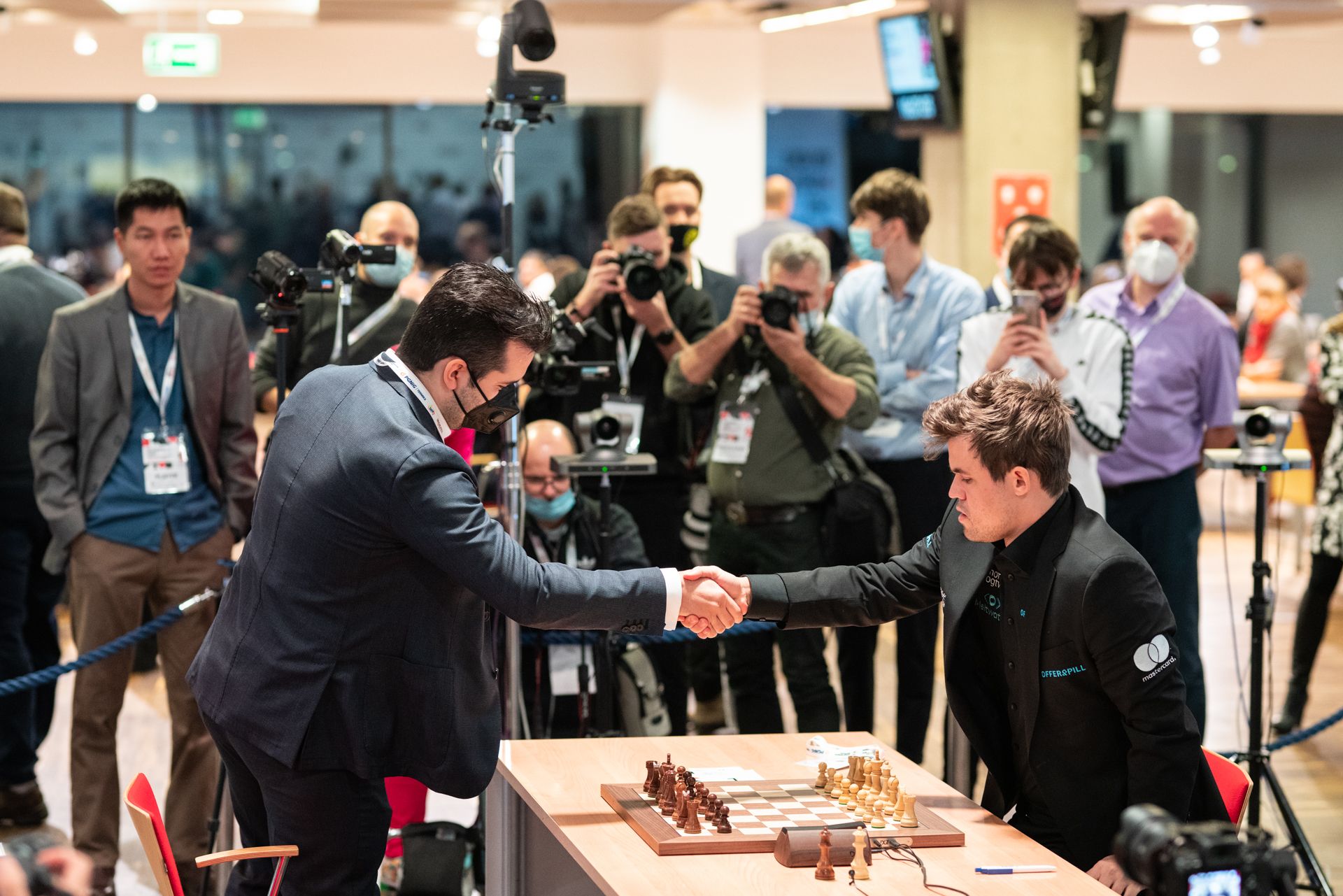
The two heavyweights agreed to a draw in what commentator GM Jon Ludvig Hammer called "the most convincing performance" against the world champion in the entire tournament. After repeating the Catalan opening from their match encounter, Carlsen missed only one opportunity on move 15, where Na4 would have given him an advantage. But besides that, it was a game so clean it could have easily been mistaken for a classical game.
GM Jan-Krzysztof Duda vs. Caruana ended in a high-class draw, displaying the high quality of chess these grandmasters are capable of even in shorter time controls. Meanwhile, Abdusattorov saved a game where he was dead-lost more than once. and held onto the lead. Like Nakamura did in his game against Firouzja, the youngster proved impossible to beat in this tournament, no matter how bad some of his positions were, as we will see again and again throughout subsequent rounds.
Enigmatically, after firmly outplaying the world's number-two, GM Ivan Cheparinov agreed to a draw with Firouzja in an objectively winning position. After he defeated GM Anish Giri on the previous day, spectators would have been dazzled with another remarkable victory.
GM Gukesh D, the Indian prodigy who earned his GM title at age 12, jumped into a tie for second-place after defeating GM Baadur Jobava, who was performing exceptionally in this tournament. He converted an unusual endgame with an extra rook against four connected passed-pawns.
This round also featured some strong endgame technique by elite grandmasters, even despite the short time control. Grischuk converted a model game using the bishop-pair advantage. Meanwhile, Giri nicely demonstrated the power of a passed rook pawn against a knight.
A pretty finish! 👏
— ChesscomLive (@ChesscomLive) December 28, 2021
GM @anishgiri nicely demonstrates the power of a passed rook-pawn against a knight, sacrificing his bishop in an endgame! #RapidBlitz
Full game: https://t.co/ddCv2OmctX pic.twitter.com/l7Q66GdnD7
Going into round 12, Abdusattorov and Nepomniachtchi remained in the lead with 8.5/11; behind them were Carlsen, Grischuk, Nakamura, Aronian, Caruana, and Gukesh.
Nepo vs. Nakamura ended in an uneventful 14-move draw in a Berlin. Meanwhile, Carlsen managed to convert, in textbook fashion, a difficult rook vs. bishop endgame with one pawn for each side. His deep exhale in the video-clip below shows just how much of an emotional toll these long squeezes can cause, even after winning.
Grischuk vs. Caruana featured a queen sacrifice by Black, but one that only lead to an equal position. The decisive blow came after Grischuk erred with 28. Kxf2??, allowing Black to break through. With this win, Caruana entered a tie for first for the first time since round two.
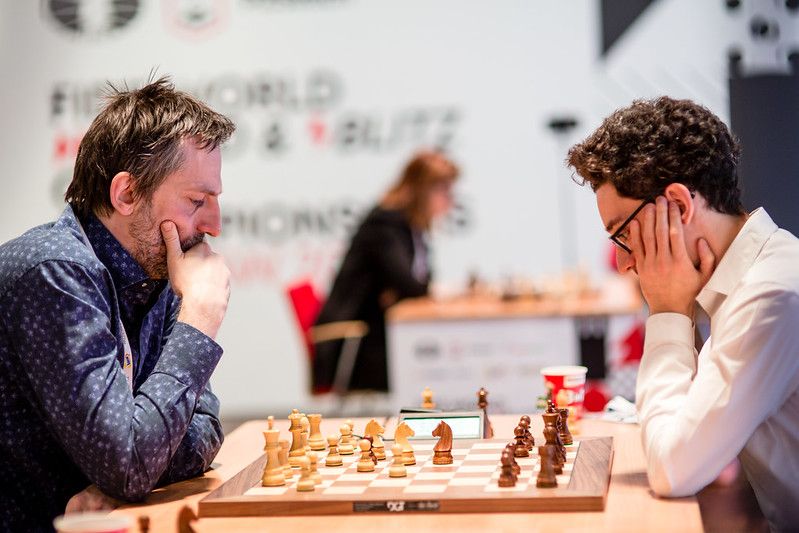
Gukesh vs. Abdusattorov was an insane game that ended in a comical draw, as sometimes happens in these extremely sharp positions. The Uzbek GM showed, once again, that he can be as slippery as soap when it comes to beating him.
The leaderboard going into the last round was what Hammer referred to as a "traffic-jam" of players. Four players were in first with 9/12: Abdusattorov, Nepo, Carlsen, and Caruana; they were followed by Nakamura, Gukesh, and Duda, half a point behind.
The premier game was between Nakamura and Carlsen, who have been rivals both over-the-board and online for many years now. Impressively, Nakamura had not lost a single game in the entire 13-round tournament, including this one against the world's number one.
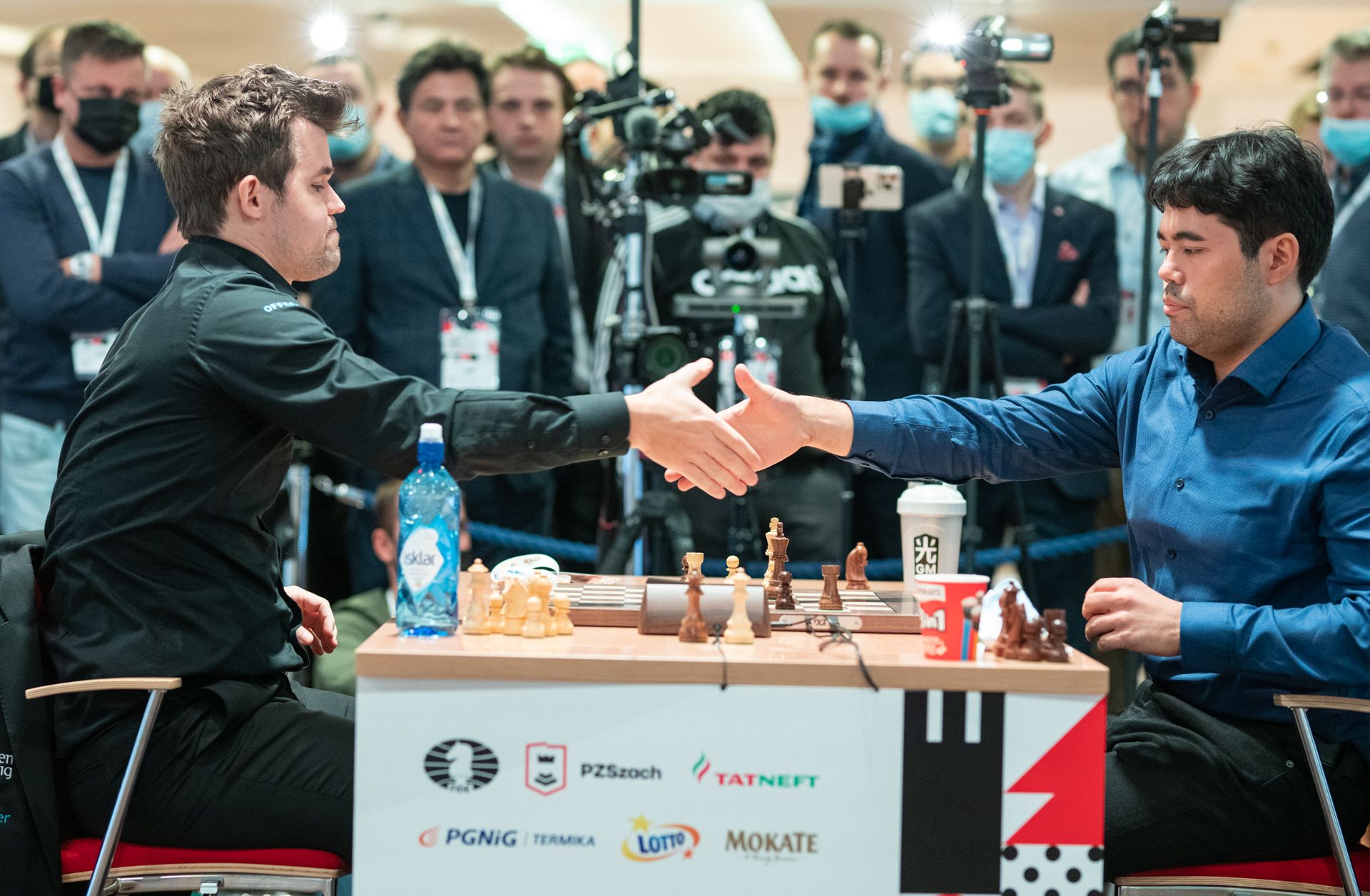
They made a professional and correct draw in a Queen's Gambit Declined; it was so solidly played, in fact, that the commentators speculated as to whether both players knew they were in a must-win situation.
All the top-board games—Caruana vs. Nepo and Abdusattorov vs. Duda—ended in draws, actually, which is not so unusual in the final rounds of these elite events, when the competition only gets increasingly harder. Abdusattorov was once again in trouble in his game, but the win slipped away from his opponent as easily as it came.
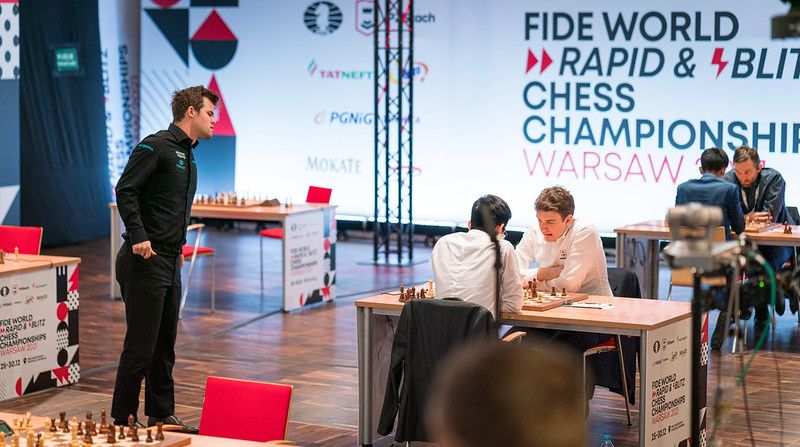
Although it did not affect standings at the top, GM Sergey Karjakin won against Firouzja in an impressive two rooks vs knight and rook endgame with zero pawns after 83 moves.
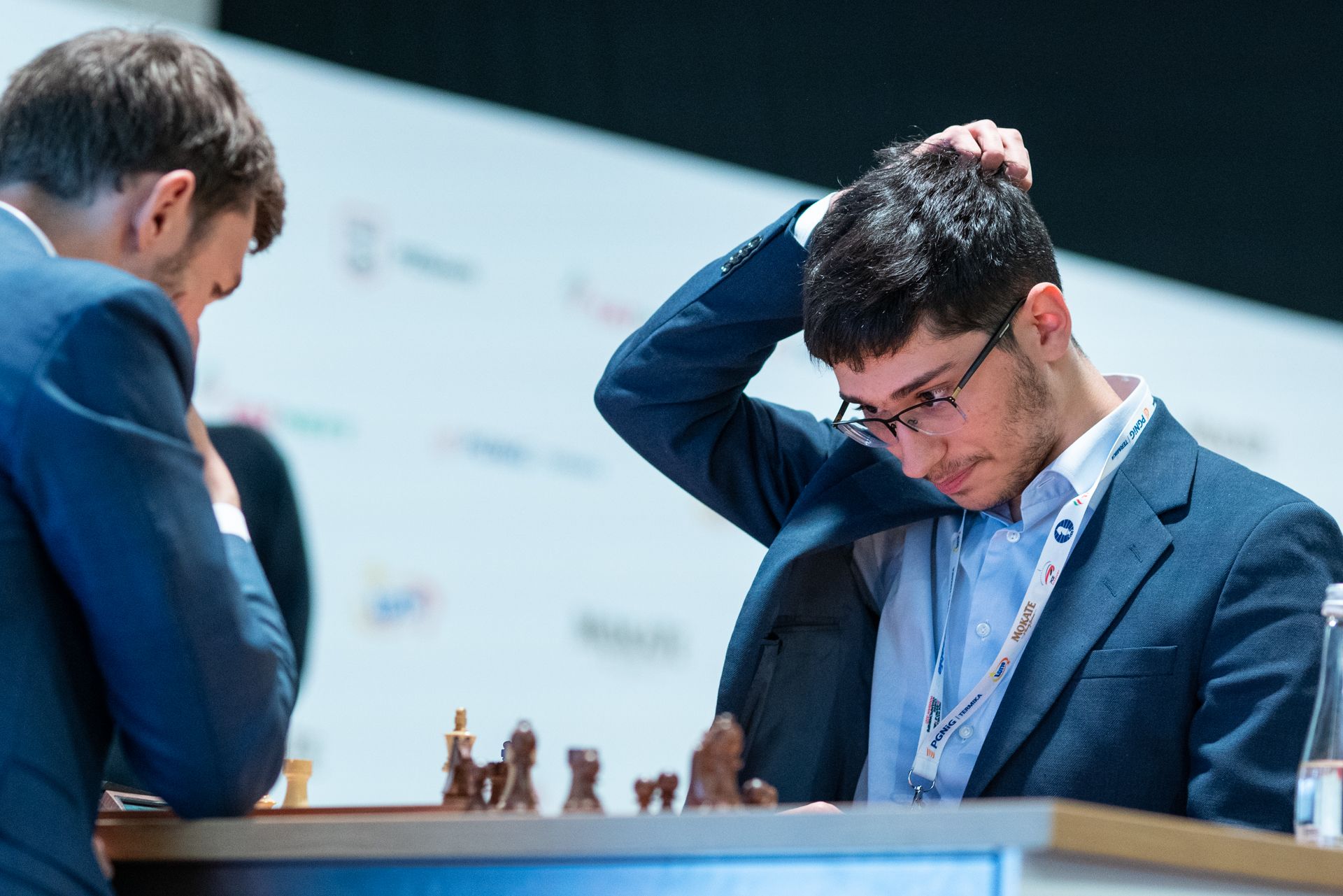
After the round, even though four players were tied for first with 9.5/13, only the two with the highest tiebreaks would participate in the playoff match. These two players were decided based on the Buchholz tiebreak system, which gives a higher score to players based on their opponents' scored points. Thus, this left Carlsen locked out of the playoff match and, after his last-round draw, he would certainly not be the world rapid champion this year.
Carlsen speaking to NRK, saying he thinks the rule about a playoff for only the top two with the same amount of points is "completely idiotic". #RapidBlitz #nrksjakk pic.twitter.com/4YMdc94cUp
— Tarjei J. Svensen (@TarjeiJS) December 28, 2021
While this controversy extended on social media platforms before, during, and long after the playoff games actually occurred, people outside of the tournament had relevant memories and opinions to share.
A few years back, there was a 4 way tie for first (unless it was 5 🤷♂️🤷♂️)… in the Sinquefield Cup. They had the same rules, but Carlsen, one of the top 2, said “everyone plays the playoff, or I don’t play!” After a meeting of the organizers, they agreed to nobody plays. Integrity
— Ben Finegold Ⓥ (@ben_finegold) December 28, 2021
Still, revising a tiebreak clause in the middle of an event with very little time is difficult for organizers, and they ultimately stuck to the system they agreed upon before the event. The final blitz playoff games were to be played between the players with the highest tiebreak scores: Abdusattorov and Nepomniachtchi. Commentator Krush observed an even score between them in Chess.com games; out of six blitz games, there were four decisive games and two draws. Thus, she called the players "closely matched."
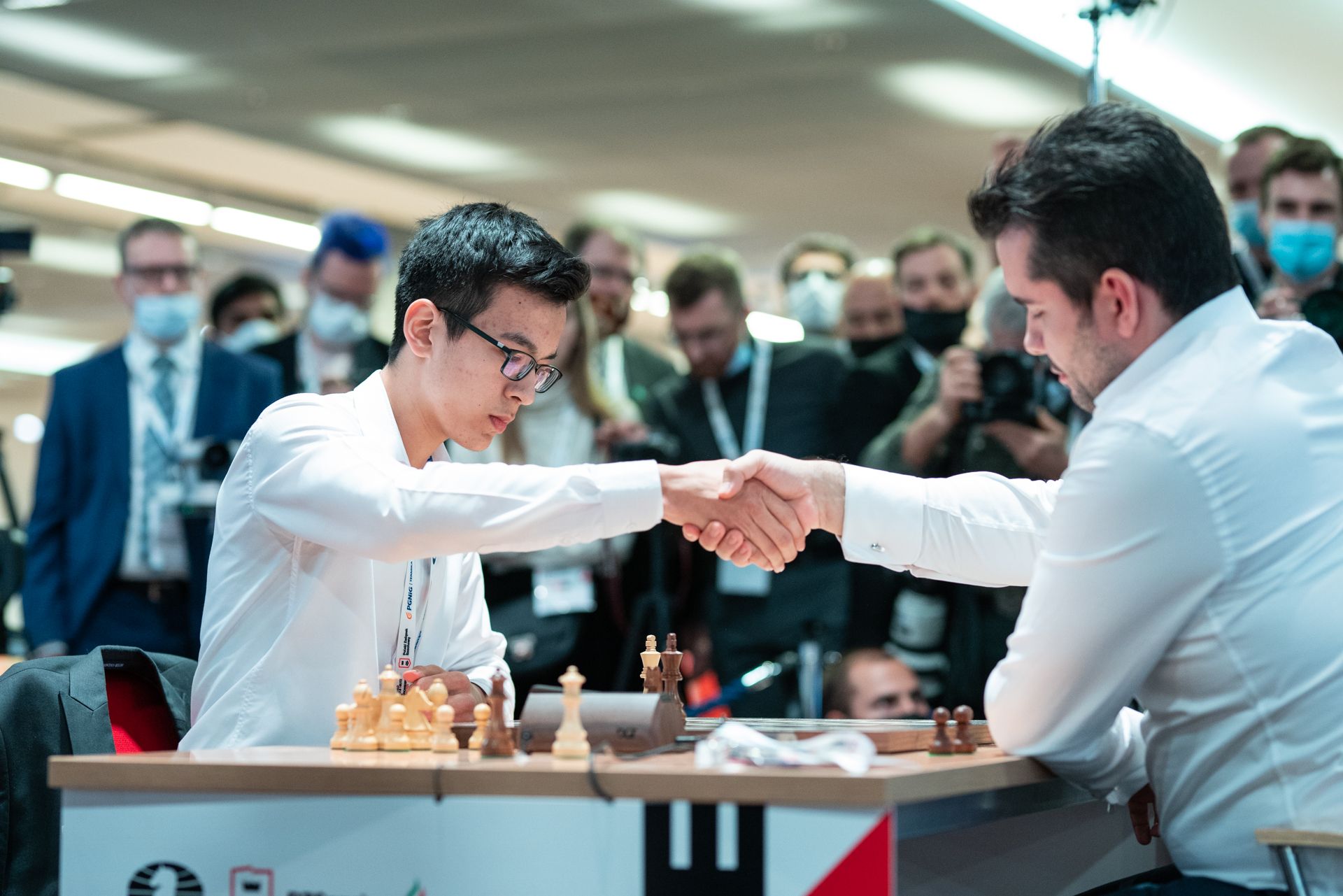
The first game saw a draw in a complicated knight endgame where Nepo ultimately sacrificed his knight to liquidate White's remaining pawns.
In the second game, however, Abdusattorov played confidently against one of the world's greatest speed-chess players. Having a time-advantage for most of the game, but ultimately slipping into a crazy under-10-second time-scramble, he emerged victorious out of a four-rook endgame.
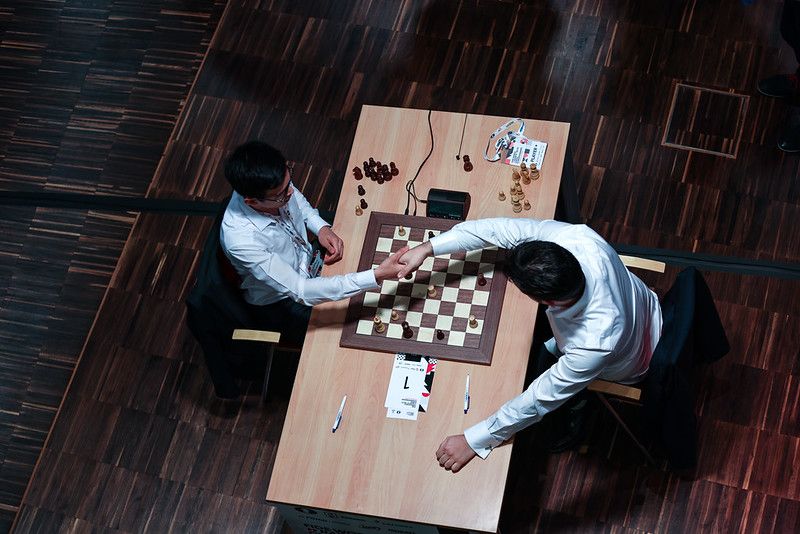
Abdusattorov, Nepomniachtchi, Carlsen, and Caruana all pocketed $45,000, sharing the total of the top four prizes.
"I am happy but also tired and there is no time to relax because tomorrow is another tournament."
— International Chess Federation (@FIDE_chess) December 28, 2021
Press conference with World Rapid Champion Nodirbek Abdusattorov: https://t.co/jEoSgifhVN#RapidBlitz #WRBCC2021 pic.twitter.com/6JzZMPOMmT
Curiously, the new world rapid champion is not in the top 10 in rapid but the number 45 with an updated rating of 2671.
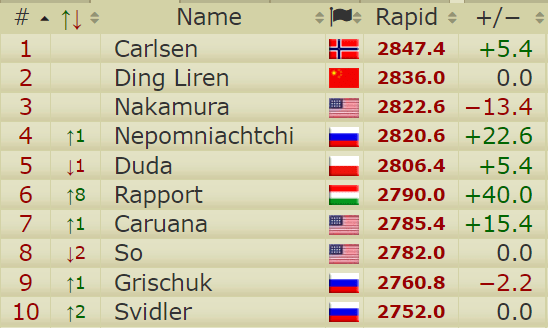
2021 World Rapid Championship | Final Standings (Top 20)
| Rk. | SNo | Fed | Name | Rtg | Pts. | TB1 | TB2 | TB3 | |
| 1 | 59 | GM | Abdusattorov Nodirbek | 2593 | 9,5 | 103,0 | 109,0 | 2674 | |
| 2 | 4 | GM | Nepomniachtchi Ian | 2798 | 9,5 | 100,5 | 107,5 | 2699 | |
| 3 | 1 | GM | Carlsen Magnus | 2842 | 9,5 | 97,0 | 103,0 | 2691 | |
| 4 | 6 | GM | Caruana Fabiano | 2770 | 9,5 | 95,0 | 100,0 | 2649 | |
| 5 | 3 | GM | Duda Jan-Krzysztof | 2801 | 9,0 | 98,0 | 103,0 | 2679 | |
| 6 | 14 | GM | Aronian Levon | 2728 | 9,0 | 96,0 | 100,0 | 2544 | |
| 7 | 2 | GM | Nakamura Hikaru | 2836 | 9,0 | 95,5 | 102,0 | 2650 | |
| 8 | 15 | GM | Mamedyarov Shakhriyar | 2727 | 9,0 | 92,0 | 98,0 | 2588 | |
| 9 | 174 | GM | Gukesh D | 2050 | 9,0 | 91,0 | 95,0 | 2619 | |
| 10 | 10 | GM | Rapport Richard | 2750 | 9,0 | 88,0 | 94,0 | 2592 | |
| 11 | 9 | GM | Karjakin Sergey | 2757 | 9,0 | 78,5 | 82,5 | 2519 | |
| 12 | 69 | GM | Van Foreest Jorden | 2563 | 8,5 | 98,0 | 103,5 | 2715 | |
| 13 | 8 | GM | Grischuk Alexander | 2763 | 8,5 | 97,5 | 102,5 | 2655 | |
| 14 | 21 | GM | Fedoseev Vladimir | 2692 | 8,5 | 94,0 | 98,5 | 2639 | |
| 15 | 173 | IM | Mitrabha Guha | 2107 | 8,5 | 90,0 | 95,5 | 2622 | |
| 16 | 12 | GM | Dubov Daniil | 2735 | 8,5 | 90,0 | 95,5 | 2561 | |
| 17 | 5 | GM | Vachier-Lagrave Maxime | 2773 | 8,5 | 86,0 | 92,0 | 2562 | |
| 18 | 13 | GM | Salem A.R. Saleh | 2729 | 8,5 | 85,0 | 90,5 | 2556 | |
| 19 | 26 | GM | Sarana Alexey | 2680 | 8,5 | 84,0 | 89,0 | 2537 | |
| 20 | 33 | GM | Firouzja Alireza | 2656 | 8,0 | 97,5 | 102,5 | 2626 |
(Full final standings here.)
All World Rapid Championship Games
The women's event was much less hotly contested than the open because the leader was so far ahead the rest of the pack. Not giving up even a single loss in the third and final day, Kosteniuk left no hope for anyone to usurp the lead.
The first round of the day saw a face-off between the reigning women's world rapid champion, GM Humpy Koneru, and the leader of the tournament. Koneru had a few opportunities to win, especially with a chance to win a free pawn on moves 34 and 35, but the game ultimately petered out.
With a draw against one of her greatest remaining rivals, Kosteniuk looked to be in great shape to win the world title.
In the next round, the sole leader made a draw with Assaubayeva in a game that offered neither side any serious winning chances. Meanwhile, GM Kateryna Lagno, a pre-tournament favorite and reigning women's blitz champion, converted an opposite-colored bishop endgame nicely.
Round 11 in the women's section featured a funny opening remark by our commentary team, which made the chat go wild, during the game between Lagno (left) and Kosteniuk (right):After a surprising, 26-move gift of a draw, where many pieces still remained on the board, Kosteniuk won the world rapid title!
The teenage IM Assaubayeva won her last-round game against established GM Nana Dzagnidze in only 34 moves. After the Georgian miscalculated, playing 16...Bxd4, the rest of the game played like clockwork for the young lady.

While the last round of the open section was underway, Kosteniuk shared some thoughts about the tournament in a press conference.
Alexandra Kosteniuk "The game with Valentina [Gunina] was very special - I was losing terribly and saw several ways for her to finish the game...After finally winning it I knew that luck was on my side. Sometimes you need to get lucky in order to win the tournament." #rapidblitz pic.twitter.com/S5sw0mzGNs
— International Chess Federation (@FIDE_chess) December 28, 2021
She also said: "I haven't lost a single game throughout the tournament, and of course, it helps a lot. When you lose, you have to find the balance, fight back. I was lucky not to lose any."

Kosteniuk earned $40,000 for first place and Assaubayeva $30,000. Gunina and Lagno got $17,500 for sharing third and fourth place. In addition, the new women's world rapid champion made great gains in her rapid rating after a tremendous performance while many of her nearest competitors suffered losses.
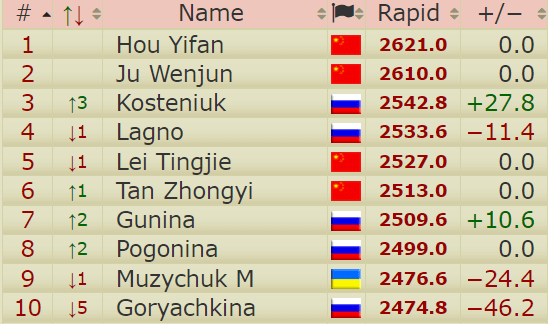
2021 Women's World Rapid Championship | Final Standings (Top 20)
| Rk. | SNo | Fed | Name | Rtg | Pts. | TB1 | TB2 | TB3 | |
| 1 | 3 | GM | Kosteniuk Alexandra | 2515 | 9,0 | 69,0 | 73,5 | 2377 | |
| 2 | 19 | IM | Assaubayeva Bibisara | 2369 | 8,5 | 65,0 | 69,5 | 2263 | |
| 3 | 5 | GM | Gunina Valentina | 2499 | 8,0 | 72,5 | 78,0 | 2374 | |
| 4 | 1 | GM | Lagno Kateryna | 2545 | 8,0 | 68,5 | 73,5 | 2299 | |
| 5 | 78 | WIM | Serikbay Assel | 2023 | 7,5 | 72,0 | 77,0 | 2399 | |
| 6 | 7 | GM | Koneru Humpy | 2483 | 7,5 | 68,0 | 71,0 | 2281 | |
| 7 | 9 | GM | Dzagnidze Nana | 2471 | 7,5 | 67,5 | 72,0 | 2307 | |
| 8 | 20 | IM | Paehtz Elisabeth | 2367 | 7,5 | 63,0 | 67,5 | 2232 | |
| 9 | 11 | GM | Stefanova Antoaneta | 2443 | 7,5 | 62,5 | 65,5 | 2291 | |
| 10 | 30 | WGM | Michna Marta | 2291 | 7,5 | 61,5 | 65,5 | 2146 | |
| 11 | 10 | GM | Abdumalik Zhansaya | 2449 | 7,5 | 60,5 | 64,0 | 2236 | |
| 12 | 15 | IM | Mammadova Gulnar | 2388 | 7,5 | 60,0 | 65,0 | 2246 | |
| 13 | 6 | GM | Muzychuk Anna | 2497 | 7,5 | 58,5 | 63,0 | 2198 | |
| 14 | 49 | IM | Vaishali R | 2201 | 7,0 | 69,0 | 72,5 | 2407 | |
| 15 | 4 | GM | Muzychuk Mariya | 2501 | 7,0 | 68,5 | 73,5 | 2310 | |
| 16 | 2 | GM | Goryachkina Aleksandra | 2521 | 7,0 | 63,5 | 68,0 | 2225 | |
| 17 | 41 | IM | Nomin-Erdene Davaademberel | 2235 | 7,0 | 63,0 | 67,0 | 2253 | |
| 18 | 22 | IM | Gaponenko Inna | 2348 | 7,0 | 61,0 | 65,5 | 2240 | |
| 19 | 23 | WGM | Berend Elvira | 2344 | 7,0 | 55,5 | 58,5 | 2102 | |
| 20 | 18 | IM | Kashlinskaya Alina | 2377 | 7,0 | 53,5 | 57,5 | 2107 |
(Full final standings here.)
All Women's World Rapid Championship Games
Correction: an earlier version of this report erroneously stated that the prizes were not shared among players finishing on the same number of points, but they were.
Find more information on the world rapid and blitz here.
Previous reports:


